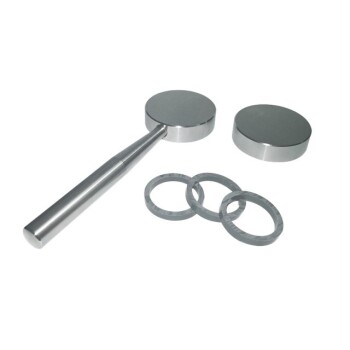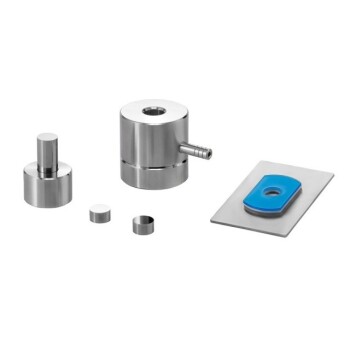In short, hydraulic mini presses are specialized tools found almost exclusively in laboratory settings. Their primary role is not brute force, but precision. You will most commonly find them in pharmaceutical, polymer, and chemistry labs where materials must be meticulously prepared for highly sensitive analytical tests like FTIR or XRF spectroscopy.
The core purpose of a hydraulic mini press is to solve a data quality problem. By compressing powders or materials into uniform pellets and thin films, it creates the perfect sample needed for analytical instruments to produce accurate and repeatable results.

The Core Function: Precision Sample Preparation
A mini press is designed to transform an irregular, difficult-to-analyze material into a standardized, homogenous sample. This preparation is a critical first step for many advanced analytical techniques.
Why Compression is Necessary for Analysis
Analytical instruments, like spectrometers, work by passing a beam of energy (like infrared light or X-rays) through or onto a sample.
If the sample is a loose powder or has an uneven surface, this beam will scatter unpredictably. This scattering creates "noise" and leads to inaccurate, unreliable data.
A mini press solves this by compacting the material into a dense, solid disc with a perfectly smooth surface, ensuring the instrument can perform a clean and accurate measurement.
Creating KBr Pellets for FTIR Spectroscopy
This is one of the most common applications. A tiny amount of the sample material is mixed with potassium bromide (KBr) powder, which is transparent to infrared light.
The mini press then applies pressure to this mixture, forming a small, transparent disc or "pellet." The infrared spectrometer can then pass its beam directly through this pellet to identify the sample's chemical makeup.
Forming Sample Pellets for XRF Analysis
X-Ray Fluorescence (XRF) is a technique used to determine the elemental composition of a material.
For accurate XRF results, the sample must be perfectly flat and homogenous. A hydraulic mini press is used to compress loose powders into a dense, solid pellet that presents an ideal surface for X-ray analysis, ensuring results are consistent and representative of the whole sample.
Polymer Thin Film Production
In materials science and polymer labs, mini presses are used for applications like hot embossing or laminating. They can press polymer materials into thin, uniform films with specific thicknesses, which can then be tested for their optical, mechanical, or chemical properties.
Key Environments Where Mini Presses Thrive
The small footprint, ease of use, and specialized function of a mini press define where it provides the most value.
University and Research Laboratories
From undergraduate chemistry labs to advanced materials science research, the mini press is a workhorse. It's used for teaching students fundamental sample preparation techniques and for preparing novel materials for characterization in R&D.
Pharmaceutical and Quality Control Labs
In the pharmaceutical industry, a mini press is crucial for quality control. It is used to prepare samples of raw materials or final products to verify their identity, purity, and composition against required standards.
Industrial R&D and Material Testing
Industrial labs focused on research and development use mini presses to test the properties of new materials. This includes investigating the effects of high pressure on substances or creating samples for durability and strength analysis on a small, manageable scale.
Understanding the Trade-offs: Mini Press vs. Larger Presses
It is critical to distinguish the "mini" press from its much larger industrial cousins. Their applications are entirely different.
Advantage: Portability and Small Footprint
Mini presses are small, often weighing only a few kilograms. They are portable and can be used on any standard lab bench without requiring dedicated space, a major benefit in crowded laboratory environments.
Advantage: Simplicity and Cost-Effectiveness
These devices are mechanically simple, manually operated, and significantly more affordable than automated or high-tonnage presses. This makes them highly accessible for educational institutions and labs with focused analytical needs.
Limitation: Lower Force Application
A mini press typically generates around 2 tons of force. This is perfect for creating small 7mm KBr pellets but is completely insufficient for industrial applications like manufacturing parts, crushing large objects, or large-scale material forming.
Making the Right Choice for Your Lab
Selecting the right press depends entirely on your objective. A mini press is a specialist tool, not a general-purpose machine.
- If your primary focus is routine spectroscopic analysis (FTIR/XRF): A hydraulic mini press is the ideal, cost-effective tool for consistent sample preparation.
- If your primary focus is teaching fundamental lab techniques: Its simplicity, safety, and low cost make the mini press an excellent choice for undergraduate labs.
- If your primary focus is high-force material testing or manufacturing: You must look beyond a mini press to larger, more powerful industrial hydraulic press systems.
Understanding its specific role as a precision tool ensures you leverage its full potential for accurate and repeatable analysis.
Summary Table:
| Application | Key Use Case |
|---|---|
| FTIR Spectroscopy | Creating KBr pellets for chemical analysis |
| XRF Analysis | Forming uniform pellets for elemental composition |
| Polymer Testing | Producing thin films for material properties |
| Common Settings | Pharmaceutical, university, and R&D labs |
Need reliable sample preparation for your lab? KINTEK specializes in lab press machines, including automatic lab presses, isostatic presses, and heated lab presses, designed to enhance accuracy in analytical testing for laboratories. Contact us today to find the perfect solution for your needs!
Visual Guide

Related Products
- Laboratory Hydraulic Press 2T Lab Pellet Press for KBR FTIR
- Automatic Laboratory Hydraulic Press Lab Pellet Press Machine
- Laboratory Hydraulic Press Lab Pellet Press Button Battery Press
- Automatic Laboratory Hydraulic Press for XRF and KBR Pellet Pressing
- Manual Laboratory Hydraulic Press Lab Pellet Press
People Also Ask
- Why is sample uniformity critical when using a laboratory hydraulic press for humic acid KBr pellets? Achieve FTIR Accuracy
- What are some laboratory applications of hydraulic presses? Boost Precision in Sample Prep and Testing
- How is a laboratory hydraulic press used for polymer melt crystallization? Achieve Flawless Sample Standardization
- What is the role of a hydraulic press in KBr pellet preparation for FTIR? Achieve High-Resolution Chemical Insights
- What role does a high-pressure laboratory hydraulic press play in KBr pellet preparation? Optimize FTIR Accuracy



















